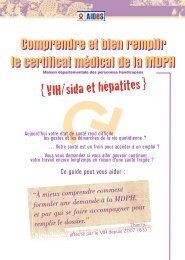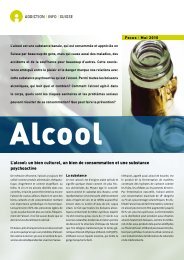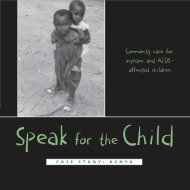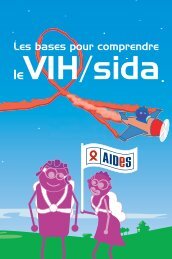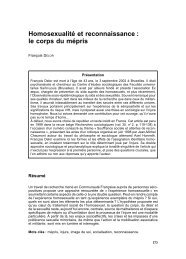Care and support for people living with HIV/AIDS
Care and support for people living with HIV/AIDS
Care and support for people living with HIV/AIDS
You also want an ePaper? Increase the reach of your titles
YUMPU automatically turns print PDFs into web optimized ePapers that Google loves.
What makes <strong>people</strong> vulnerable?knowing it. Moreover, given the very high infection rates now being seen in girls (seeFigure 18), it is unwise to expect young partners to be free of <strong>HIV</strong>.Whether sexual initiation is consensual or coerced, it may occur at a very early agein particularly marginalized communities. In a survey of 1600 children <strong>and</strong> adolescentsin four poor areas of the Zambian capital, Lusaka, over a quarter of childrenaged 10 said they had already had sex, <strong>and</strong> the figure rose to 60% among 14-yearolds.In South Africa, 10% of respondents in a study in six provinces said they hadstarted having sex at age 11 or younger. The study, commissioned by the SouthAfrican Department of Health, recommended that sex education be introduced tochildren around the age of 12 if it was to reach most of them be<strong>for</strong>e they becamesexually active. Clearly, though, it is important to complement education on <strong>AIDS</strong><strong>and</strong> life skills <strong>with</strong> vigorous action against sexual abuse <strong>and</strong> rape <strong>and</strong> campaigns todiscourage older men from seeking out young girls <strong>for</strong> sex.Box 8. Working <strong>with</strong> vulnerable girls in NepalIn Nepal, the Maiti Project has targeted children <strong>and</strong> young women who are subjectto sexual exploitation <strong>and</strong> abuse, including girls who are at risk of being sold intoprostitution in India. The project has established camps in high-risk areas, eachcamp functioning as a shelter <strong>for</strong> about 30 girls rescued from traffickers or who arein danger of being sold. The camps provide education <strong>and</strong> vocational training, as wellas <strong>support</strong> <strong>and</strong> counselling. The project has worked in conjunction <strong>with</strong> colleges,local pressure groups, village leaders, medical officers, lawyers <strong>and</strong> the police. Anevaluation suggested that Maiti Nepal prevents approximately 180 girls from beingsold into brothels in India each year. In addition, 105 <strong>people</strong> have been imprisonedas a result of the project’s ef<strong>for</strong>ts to expose child traffickers. In 1997 alone, 60 girlswere repatriated from India <strong>and</strong> three-quarters of them were subsequently reunited<strong>with</strong> their families. Taking account of the daily challenges faced by vulnerable young<strong>people</strong>, the project is remarkable <strong>for</strong> its integrated approach to their needs <strong>for</strong> shelter,food, education, health care, legal protection <strong>and</strong> <strong>support</strong>ive adult networks.Violence against womenViolence directed against girls <strong>and</strong> women – in a sense, the most egregious sign ofmale domination – makes them vulnerable to <strong>HIV</strong> infection in a number of direct <strong>and</strong>indirect ways.Violence in the homeDomestic violence reduces women’s control over their exposure to <strong>HIV</strong>. Obviously,in settings where violence is regarded as a man’s right, women are in a poor posi-49



